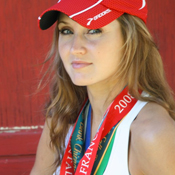Race Day Elixir
I can see it now, the peripatetic pharmacist arrayed in wicking, zippered-pocketed garb, a holographic bib number pinned to his chest, a clunky pair of Hokas strapped to his feet. He is preaching from the bed of his pickup truck—no, a trailer hitched to his pickup truck—delivering with categorical enthusiasm a panegyric on the transcendental health benefits of races. Not simply racing, mind you, but races.
 “Race day! A mystical elixir to cure physical and social ills!”
“Race day! A mystical elixir to cure physical and social ills!”
“Have you been to a race today, madam? No? No! Step up to this registration form and transform your life!”
“You, sir! When was the last time you experienced the life-altering resuscitation of a marathon course? Never, sir? Never, ladies and gentlemen! Grab a cowbell, sir, and reclaim your vitality!”
Imagine Dr. Pemberton—yes, the Coca-Cola guy—as a race director. You feeling me?
I think there is something to this concept of a race day elixir. No, not an elixir for race day, but the idea of race day as an elixir itself.
Think of the last race you ran—a 5K, a half, a full, anything—and try to recall what you heard, what you saw. Did other runners talk to you? What did they say? There were spectators, right? Did they cheer you on? What about themed groups—cheerleaders from local schools waving purple pom-poms or gray-haired accordion enthusiasts from the local polka club rocking beer barrel tunes? And the volunteers—miles upon miles of volunteers—offering water at no small risk to themselves (hours of splashing adds up), warding off cars against unwelcome trespass, brandishing signs to ensure that HALF MARATHON STAY LEFT AND MARATHON STAY RIGHT, and, with royal authority, placing finisher’s medals around our necks.
How many times were you encouraged, praised, rallied, or energized by a runner as you passed her (or as she passed you), from a toddler in a wagon, waiting for her dad (but, hey, may as well wave at you, too), from an old guy in a bathrobe standing on his front lawn, clutching a newspaper and a Maltese cotton ball of a dog (and obviously, up to this very moment, unaware there was a marathon this weekend)?
Race day is medicinal exactly because of its positivity. In a world in which criticism and vitriol abound—and are fueled by increasingly impersonal social media platforms—there is something healing in simply being human and having another human say, hey, you’ve got this, and I’m here for you. Hope is therapeutic. Optimism is cleansing. Cheerfulness is contagious. A race is a giant YOU CAN DO IT.
And that’s good for the soul. And mind. And body.
Barbara Fredrickson, a researcher at the University of North Carolina, famously published the broaden-and-build theory of positive emotions. This is more than just “think happy thoughts.” Fredrickson’s studies reveal that deliberate positivity actually expands the mind and its ability to recognize opportunity and potential, while fear and negativity narrows and limits the thought process. When the mind is opened by positive thoughts, it is able to draw from a deeper pool of cognitive, psychological, social, and physical resources. Researchers are only beginning to explore the effects positive (and, conversely, negative) thoughts have on our physiology—from cell health to increased cognition to the ability to recover from an injury or illness.
As King Solomon of Israel noted almost three thousand years ago: “Anxiety in the heart of a man causes depression, but a good word makes it glad” (Proverbs 12:25, NKJV).
Imagine running a marathon with only negative interactions—spectators pointing out your flaws, fellow runners ridiculing your stride, volunteers withholding water, cars cutting you off. Aside from the scenario being ridiculous, the image is pretty awful, right?
It’s also not that ridiculous. We all encounter varying degrees of criticism on a daily basis. Whether it comes in the form of rejection, a joke made at our expense, streaming news headlines, or a magazine cover reminding us how we’ve fallen short, negativity has a way of seeping its way into our lives.
Even worse, I’m guilty of contributing to it myself.
But what if we could bottle up race day? What if we could concoct a tincture of an enthusiastic and empathetic community dedicated to empowering one another? What if, instead of growing frustrated with people, we ran a few steps with them? What if, instead of criticizing, we cheered them on? What if we told them that we believed in them? What if they told us the same?
There really is something magical about race day. Individual by nature; spectacularly, unforgettably collective in experience.
“Step right up, folks! Step right up!”

Amy L. Marxkors is the author of The Lola Papers: Marathons, Misadventures, and How I Became a Serious Runner and Powered By Hope: The Teri Griege Story. Click here to receive Amy's weekly article via email.
Connect With Us
see the latest from Fleet Feet St. Louis